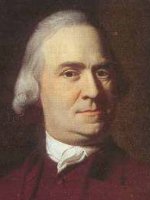
I thoroughly enjoyed the talk that
Jeremy Black, professor at the University of Exeter, delivered to the
Lexington Historical Society on Friday night. And so did the standing-room-only crowd.
Prof. Black has written an astonishingly long list of books of political and military history, including this
biography of George III published by Yale University Press. Among his most popular titles is
The Politics of James Bond, and it was clear from the discussion over “biscuits” afterwards that Black thinks as seriously about popular cinema as about military history.
In his talk, titled “Could the British Have Won the American War of Independence?”, Black asked us to consider the advantages the British government had going into the North American colonial revolt that broke out hereabouts in 1775.
First, the British Empire had the world’s strongest
navy. In contrast, the U.S. of A. had none. It eventually sent out individual privateers, but didn’t commission a true navy until the
John Adams administration. With 75% of the American population living 75 miles or less from the Atlantic coast, the British military could reach a great deal of what mattered in the colonies. After leaving Boston in 1776, the British held each of the other five largest U.S. ports for extended periods.
Second, the British government had the world’s strongest financial system. British credit could raise money easily at home and in Europe, so the government prosecuted the war for years without raising taxes. In contrast, the young U.S. government was not only financially unproven, but, since the rebellion had started as resistance to new taxes, it faced a hard task in asking its citizens to pay higher taxes, even now that they were represented in its
Continental Congress.
Third,
Lord North’s government won an election in 1774, and another in 1780. It had the support of the
king. Though there was a vocal opposition to that government’s North American policy in
Parliament, those voices remained decidedly in the minority.
Fourth, the British military had commanders and soldiers experienced both in putting down rebellions, such as Charles Stuart’s incursion from Scotland in 1745, and even more recently in fighting in North America.
Fifth, of Britain’s twenty-six colonies in North America, only thirteen joined the rebellion, even after concerted diplomatic and military efforts by the Congress. The Royal Navy still had its two major bases in the hemisphere, at Halifax and Jamaica. Despite an American invasion of
Canada and naval raids on
Caribbean provinces, that part of the empire remained basically intact through the war.
Sixth, there was a significant minority of colonists, larger in some regions and smaller in others (such as New England and Virginia), larger at some times and smaller at others, who were willing to align with the Crown and even fight for it.
Finally, from 1775 to 1777, the British military had no other active foes to fight—not its usual situation in the eighteenth century. Not until the first half of 1778 did
France enter the war on the American side, threatening British ships in the Atlantic and imperial outposts in India, Senegal, and the Caribbean.
Given those strengths and the corresponding American weaknesses, Black reminded us, it’s easy to imagine ways that George III’s Britain might have forced another end to the war, short of independence for all thirteen rebellious colonies in 1783. The people of the time certainly didn’t take that outcome of the conflict for granted. However, Black also felt that eventually what we know as the U.S. of A. would have become independent within a few decades in any event. (He argued that the decade most important for determining power in North America was actually 1861-71, when the U.S. stayed united and started to spread west more rapidly, and Britain and France joined Spain in pulling out of our neighbors to the north and south.)
As I look over Black’s list of British strengths, I’m struck by how many the Crown still had at the end of the war. Its navy was still powerful, its army held two of America’s five largest ports, its other colonies were still solidly in the Empire, and its government and financial system were still sound (especially compared to what had happened to the Congress and its currency). But news of Cornwallis’s surrender at
Yorktown dismayed the independent Members of Parliament who had previously supported North’s government. Their votes of no confidence forced George III to offer the ministry to the opposition Rockingham Whigs, who demanded a change in policy toward America. The Empire could have kept up the war; the question had become, why would it want to?


